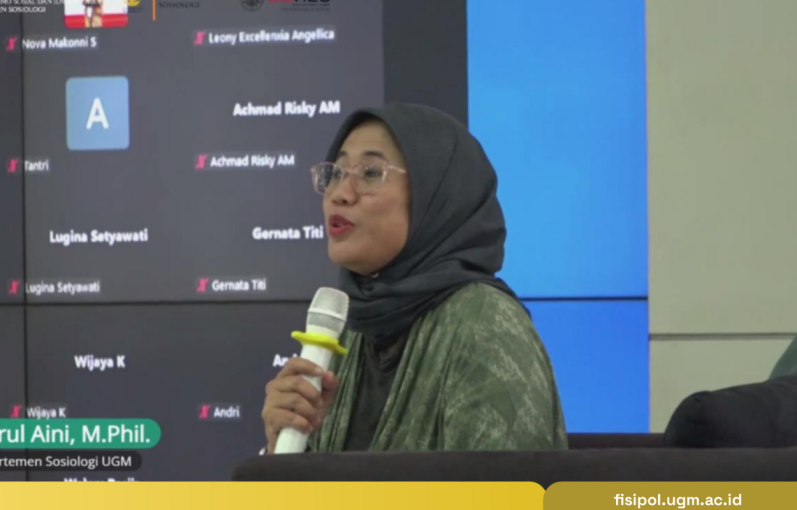
Yogyakarta, 30 April 2025–Concerns about the return of the role of the military and police in the civilian space have surfaced again. Located at the 4th Floor Auditorium of the Faculty of Social and Political Sciences UGM, the Department of Sociology UGM, together with the Department of Sociology UI and Social Research Center (SOREC) UGM held a public discussion entitled “The Return of Uniformed History: Challenging the Military and Police State of the Republic of Indonesia”. The discussion was presented by Dr. Arie Sujito (Department of Sociology UGM), Dr. Joash Elisha Tapiheru (Department of Politics and Government UGM), Dra. Jaleswari P., M.Hum. (LAB 45), Prof. Dr. Iwan Gardono S. (Department of Sociology, University of Indonesia), Najib Azca, Ph.D. (Department of Sociology, UGM) and Nurul Aini, M.Phil. as moderator.
The topic of the military and police has become increasingly relevant in recent weeks. This is not only because of the passing of the Indonesian National Army Law (UU TNI), which sparked controversy, but also because of the emergence of proposed revisions to the Draft Law on the Indonesian National Police (RUU Polri), which is part of a number of problematic regulations.
“Partial defence and security sector reforms in the first decade after the reformation did not continue, not even to completion. I call it stagnation,” said Dr. Arie Sujito, the keynote speaker, in his presentation.
The collective memory of the Indonesian people regarding the practice of ABRI’s Dual Function is still lingering. During the New Order era, the military and police were united under the command of ABRI and played an active role in civilian government. This made the uniformed apparatus a tool of power that perpetuated abuse of authority through corruption, collusion, and nepotism (Korupsi, Koalisi, dan Nepotisme or KKN) and undermined the foundations of democracy itself.
Now, the return of similar nuances is starting to be felt. The latest regulation allows the TNI to be deployed to handle communal conflicts. This step is considered worrying, considering the rampant reports of violence by TNI personnel in the last five years, ranging from intimidation to persecution.
Dra. Jaleswari P., M. Hum. from LAB 45 also enriched the discussion by presenting the latest data and context of the issue. According to her, Indonesia’s democracy has shown symptoms of decline over the past decade. However, this is not reflected in public perception. Surveys show public satisfaction with law, politics, and security has increased. Ironically, this situation is often used to accelerate the ratification of controversial regulations without accountable public participation.
“Similarly, if we look at the trend of public satisfaction with the government, it seems high, but our democracy is down. So we have to look at what is behind the data,” Jaleswari explained in the discussion.
This discussion is essential for civil society not to let its guard down. The community must continue to intensify collective action because militarisation is too intense. According to Prof. Dr. Iwan Gardono S, demilitarisation requires active participation from civil society. By maintaining civil society partnerships, public awareness of the importance of democracy can be maintained.
With this public discussion, Fisipol UGM strives to achieve SDG 16, Peace, Justice and Strong Institutions.
